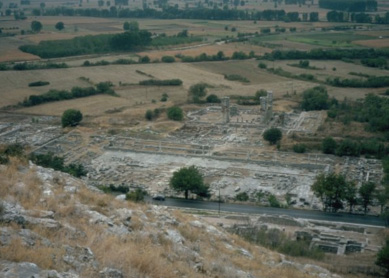At the end of his letter to the Romans, Paul includes a list of greetings to individual members of the community—a commonplace ancient letter-writing element. Romans 16 presents us with a fascinating look at Paul’s network in Rome and a peek at who might have played certain roles in the community. Among the ten women mentioned in the chapter, Junia has been the focus of attention and controversy in the last century.
Who was Junia?
First, as stated above, she was one of ten women of note mentioned in Paul’s letter, indicating that women played visible, active, and significant roles in the community—and that it was socially (and theologically, one can argue) important that Paul greet them and praise them publicly in his writing. Rom 16:7 offers further details on Junia’s identity. She is paired with Andronicus, which makes it likely that they were either married or siblings, as is the case with other paired names of Paul’s greetings. Paul calls her a “relative,” which indicates that even if not a literal relation of Paul’s by birth, Junia was a Jew and part of his kindred (see Rom 9:3, which uses the same word to signify the Jewish people). Junia also spent time imprisoned with Paul, meaning she probably preached, taught, and led groups of people so as to land her in jail, just as Paul had. This is corroborated by Paul’s naming her an apostle—and a prominent one at that. We can also glean from Rom 16:7 (“they are prominent among the apostles, and they were in Christ before I was”) that Junia was an apostle and a follower of Jesus before Paul, placing her perhaps among the earliest generation of community leaders and probably in Palestine before her arrival in Rome.
Junia’s identity as a woman and apostle caused some controversy for scholars in the last century, but this controversy—and implicit rejection of a woman’s ability or right to hold such a position—is a needless, modern concern. Early Christian writers clearly understood Rom 16:7 to identify the woman Junia as an apostle. John Chrysostom writes in the fourth century, “Oh how great is the devotion of this woman, that she should be even counted worthy of the appellation of apostle!” (Hom. Rom. 31). It was not until the twentieth century that the debate over Junia’s name began in earnest, when IOYNIAN was rendered masculine in some Greek editions of the New Testament—that is, the name was printed as Ἰουνιᾶν, which is masculine, instead of Ἰουνίαν, which is feminine, the only difference being the accenting of the word. Since ancient Greek manuscripts contain no accent marks, some editors believed there was reason to question the feminine form of the name, which they argued could have been masculine, since there was no indicative accenting of the name. Subsequently, English translations thus printed the masculine name “Junias.”
But this shift in gender should not have occurred. There are hundreds of occurrences of the feminine name “Junia” in the Greco-Roman world of the first century. Occurrences of a masculine “Junias” or the longer “Junianus” number a total of zero.
Since early Christian writers and later scribes understood the person of Rom 16:7 as a woman, and ancient texts testify to the feminine name “Junia” overwhelmingly, the only reason to render the name masculine comes from resistance to a woman apostle. The explanation for the printing of a masculine name in the United Bible Societies’ Greek edition is stated explicitly as due to “some members, considering it unlikely that a woman would be among those styled ‘apostles’” (see the discussion in Bruce M. Metzger, A Textual Commentary on the Greek New).
Was Junia anomalous among early Christian women?
Was it unlikely that a woman was an apostle? Was Junia an anomaly among early followers of Jesus? She is certainly the only woman named an apostle in the New Testament and early Christian texts. But much of the answer to these questions depends on what one defines as an “apostle” and when. Paul’s usage of the term is rather fluid, sometimes meaning one who encountered the postresurrection Jesus (1Cor 15:7), or someone part of the Jerusalem leadership before Paul (Gal 1:17-19), or a traveling missionary afforded certain rights (1Cor 9:1-18), or an emissary of a church (2Cor 8:23; Phil 2:25), or any combination of these. The author of Luke and Acts, writing several decades after Paul, focuses on the Twelve Apostles and thus narrows the definition of the term considerably. But, ironically, according to the narratives of Luke and Acts, the women followers of Jesus (see Luke 8:1-3, Luke 23:49) would more than qualify as apostles in Paul’s use of the term. They witnessed Jesus’s ministry, crucifixion, and resurrection (more so than the male disciples); they formed part of the core community in Jerusalem before Paul arrived on the scene (Acts 1:14); and they traveled as missionaries (see Priscilla in Acts 18). We also know from Paul himself that Phoebe served as an emissary between communities (Rom 16:1). Junia’s explicitly stated title of apostle may be anomalous, but apostolic women during her time were not.





